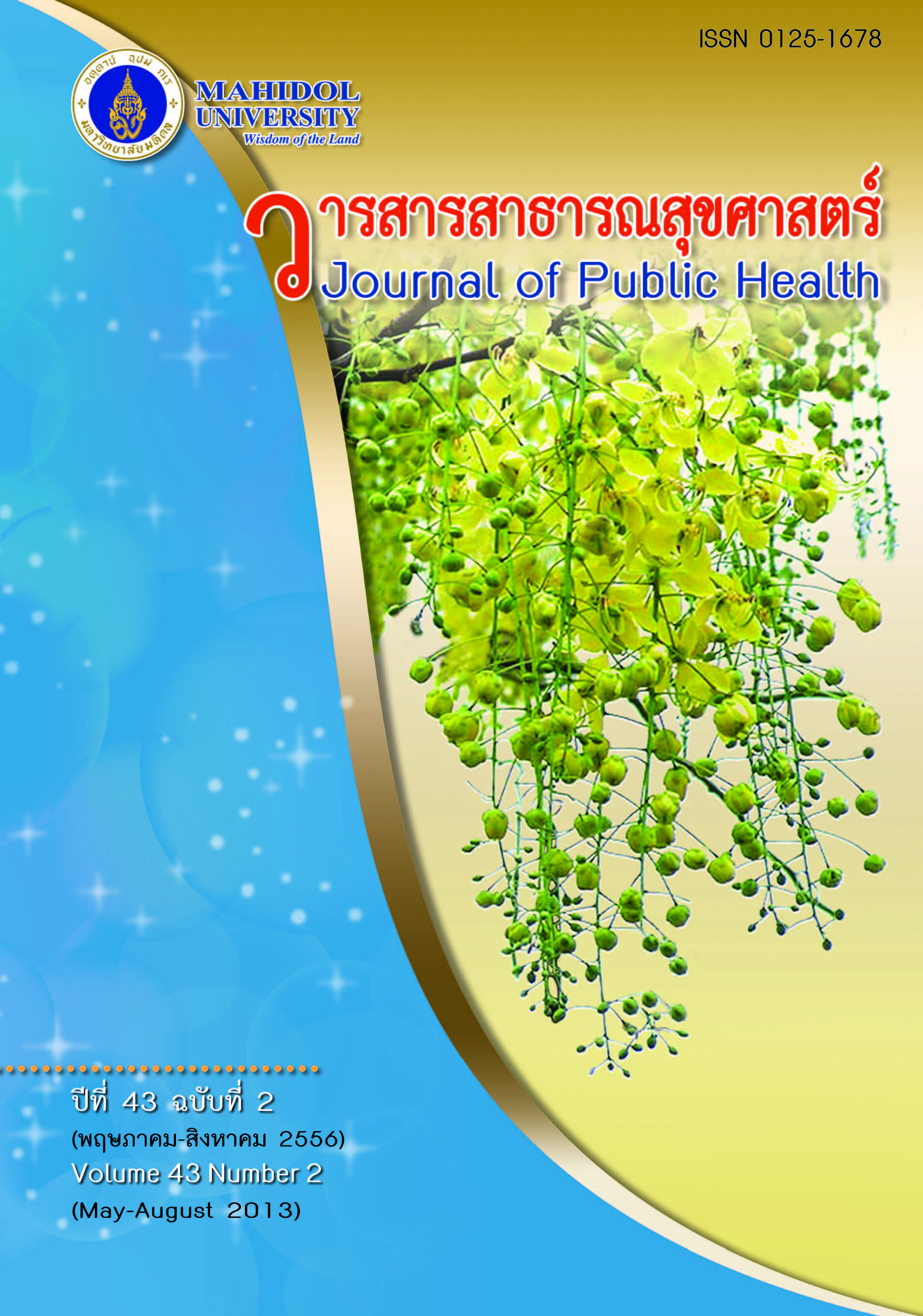การส่งเสริมการบริโภคผักและผลไม้โดยประยุกต์ทฤษฎีการเรียนรู้ทางปัญญาสังคม ในนักเรียนชั้นประถมศึกษาปีที่ 4 อำเภอพรหมพิราม จังหวัดพิษณุโลก
Keywords:
การบริโภคผักและผลไม้, ทฤษฎีการเรียนรู้ทางปัญญาสังคม, นักเรียนชั้นประถมศึกษาปีที่ 4, Fruit and vegetable consumption, Social cognitive theory, Fourth grade studentsAbstract
บทคัดย่อ
ผักและผลไม้เป็นอาหารที่เป็นปัจจัยปกป้องและชะลอการเกิดโรคเรื้อรัง แต่ยังพบว่า มีการบริโภคผักและผลไม้ต่ำกว่าปริมาณที่แนะนำในเกือบทุกกลุ่มอายุโดยเฉพาะเด็กวัยเรียน การวิจัยกึ่งทดลองนี้ มีวัตถุประสงค์เพื่อศึกษาประสิทธิผลของการส่งเสริมการบริโภคผักและผลไม้ โดยประยุกต์ทฤษฎีการเรียนรู้ทางปัญญาสังคม กลุ่มตัวอย่างเป็นนักเรียนชั้นประถมศึกษาปีที่ 4 จำนวน 64 คน จาก 2 โรงเรียน ในอำเภอพรหมพิราม จังหวัดพิษณุโลก โดยการสุ่มอย่างง่ายได้ 1 โรงเรียนเป็นกลุ่มทดลอง มีนักเรียนจำนวน 34 คน และอีก 1 โรงเรียนเป็นกลุ่มเปรียบเทียบ มีนักเรียนจำนวน 30 คน ระยะเวลาศึกษา 12 สัปดาห์ ระหว่างเดือนสิงหาคมถึงพฤศจิกายน 2555 ประกอบด้วย ระยะทดลอง 8 สัปดาห์ และระยะติดตามผล 4 สัปดาห์ รวบรวมข้อมูลโดยใช้แบบสอบถามแบบตอบด้วยตนเอง และแบบบันทึกการบริโภคผักและผลไม้ วิเคราะห์ทางสถิติโดยใช้ค่าเฉลี่ย ส่วนเบี่ยงเบนมาตรฐาน และการวัดซ้ำ ผลการวิจัย พบว่า หลังการทดลอง กลุ่มทดลองมีคะแนนเฉลี่ยความรู้ การรับรู้ความสามารถของตนเอง ความคาดหวังในผลดี และมีปริมาณเฉลี่ยการบริโภคผักและผลไม้สูงขึ้นกว่าก่อนการทดลอง และมากกว่ากลุ่มเปรียบเทียบอย่างมีนัยสำคัญทางสถิติ (p<0.05) การวิจัยนี้ชี้ให้เห็นว่า การส่งเสริมการบริโภคผักและผลไม้โดยประยุกต์ทฤษฎีการเรียนรู้ทางปัญญาสังคม มีส่วนช่วยเพิ่มความรู้ การรับรู้ความสามารถของตนเอง ความคาดหวังในผลดี และทำให้นักเรียนบริโภคผักและผลไม้เพิ่มขึ้น ดังนั้น โรงเรียนควรนำกิจกรรมไปประยุกต์ใช้ เพื่อเป็นการสร้างเสริมพฤติกรรมสุขภาพที่ดีและยั่งยืน
Promoting Fruit and Vegetable Intake through the Application of Social Cognitive Theory among 4th Grade Students in Phrompiram District, Phitsanulok Province
ABSTRACT
Eating fruits and vegetables is one of the protective factors for prevention of chronic diseases. However, there is low consumption of fruits and vegetables in all age groups in Thailand, especially among school age children. The purpose of this quasi-experimental study was to evaluate the effectiveness of promoting fruit and vegetable intake through the application of social cognitive theory. The sample consisted of 64 students in 4th grade in 2 schools in Phrompiram District, Phitsanulok Province. Participanting schools were assigned at random to an experiment group (n=34) or a comparison group (n=30). A 12-week study period, during August to November 2012 included an 8-week experimental and a 4-week follow-up period. Data were collected by self-administered questionnaires and a fruit and vegetable record. Statistical analysis was performed using mean, standard deviation and repeated measures. Results indicated that after the intervention the experimental group had significantly higher mean scores of knowledge, self-efficacy, and outcome expectation, and consumed fruit and vegetables more than before the intervention in contrast to the comparison group (p<0.05). Activities promoting fruit and vegetable intake through the application of social cognitive theory increased knowledge, self-efficacy, outcome expectation and increased consumption of fruits and vegetables. Therefore, schools should adopt these activities to promote healthy, sustainable eating behaviors .
Downloads
Issue
Section
License
Creative Commons License CC-BY-ND


